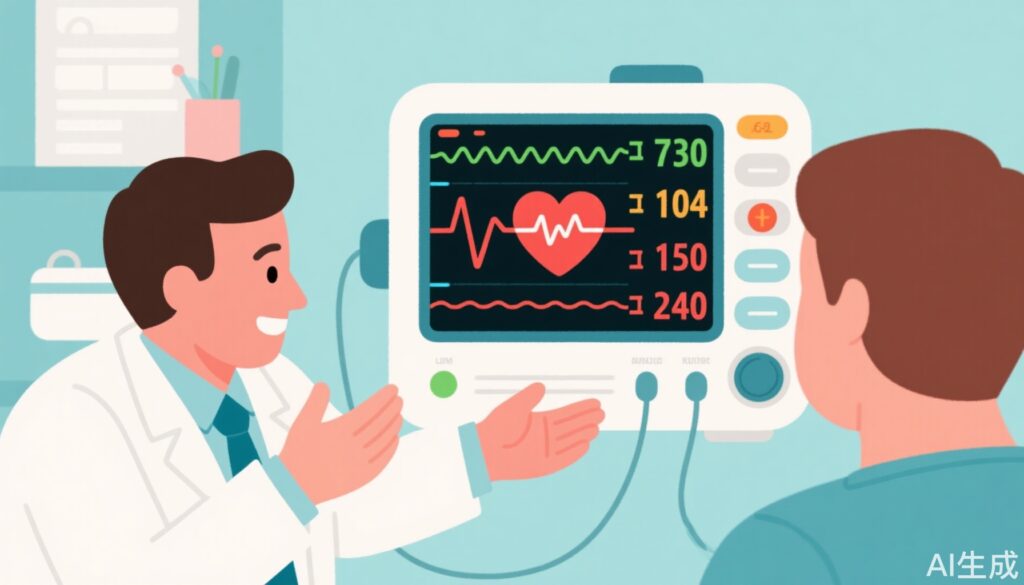Background and Aims
This study focuses on the effects of discontinuing β-blocker medications on blood pressure (BP) and heart rate (HR) following a myocardial infarction (MI). Specifically, it presents data from the AβYSS trial, which randomized patients to either continue or interrupt β-blocker therapy after experiencing an MI. The aim is to evaluate whether stopping β-blockers leads to changes in these cardiovascular parameters, which are critical for patient outcomes.
Methods
A total of 3,698 patients enrolled in the AβYSS trial were analyzed. Changes in HR and BP from baseline to the point of randomization were assessed using a linear mixed repeated model, with a median follow-up of 3.0 years. The study also explored the changes in HR and BP and their consequences on the primary endpoint, which included death, recurrent MI, stroke, and hospitalization for cardiovascular issues. These were evaluated in pre-specified subgroups classified by the presence or absence of a hypertension history, utilizing both linear mixed repeated models and adjusted Cox proportional hazards models.
Results
The results demonstrated that β-blocker interruption resulted in a notable increase in both systolic and diastolic BP, as well as resting HR at the six-month mark.
– Systolic BP increased by +3.7 mmHg [95% CI: 2.6, 4.8], P < .001.
– Diastolic BP increased by +3.3 mmHg [95% CI: 2.6, 4.0], P < .001.
– Resting HR increased by +10 beats per minute [95% CI: 9, 11], P < .001.
These changes remained consistent throughout the follow-up period, despite an increase in the use of antihypertensive medications within the β-blocker interruption cohort. The effects of β-blocker cessation were observed in both patients with hypertension (43% of the sample) and those without. Notably, hypertensive patients were found to be at a higher risk for adverse events, with 25.8% experiencing negative outcomes compared to 19.2% of non-hypertensive patients. The adjusted hazard ratio for events in hypertensive patients stood at 1.18, with a 95% confidence interval of 1.01-1.36 (P = .03). Most concerning was the pronounced increase in the primary endpoint among hypertensive patients randomized to β-blocker interruption, where the risk difference was calculated at 5.02% (95% CI: 0.72%-9.32%, P = .014).
Conclusions
The findings of the AβYSS trial indicate that interrupting β-blocker treatment following an uncomplicated MI can result in significant and sustained elevations in both blood pressure and heart rate. These increases may lead to adverse outcomes for patients, particularly for those with a history of hypertension. Physicians should carefully consider the risks associated with discontinuing β-blockers in this patient population, weighing the potential for higher BP and HR against the benefits of the treatment regimen.
References
– Procopi N, Zeitouni M, Kerneis M, Cayla G, Ferrari E, Range G, Puymirat E, Delarche N, Guedeney P, Beygui F, Desprets L, Georges JL, Bochaton T, Schiele F, Ducrocq G, Hauguel-Moreau M, Dumaine R, Slama MS, Payot L, El Kasty M, Aacha K, Diallo A, Girerd X, Vicaut E, Silvain J, Montalescot G. Beta-blocker interruption effects on blood pressure and heart rate after myocardial infarction: the AβYSS trial. Eur Heart J. 2025 Aug 1;46(29):2894-2902. doi: 10.1093/eurheartj/ehaf170. Erratum in: Eur Heart J. 2025 Jul 10:ehaf510. doi: 10.1093/eurheartj/ehaf510. PMID: 40401436.



